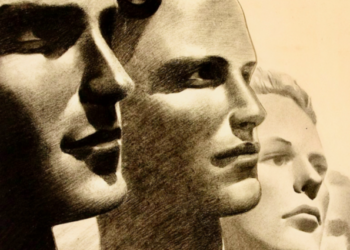The resort to violence has become the characteristic American response to a world that seems to many to lie beyond their control. Almost from the beginning, violence wrote itself into the American story. Violence seems now to be inscribing itself onto the American soul.
 Although the story has disappeared from the news cycle, Luigi Mangione’s alleged murder of Brian Thompson, the CEO of United Health Care, and the public response to the killing, have exposed the increasingly barbarous character of American society. A disciple of Ted Kaczynski, Mangione, like Kaczynski, believes that human beings are animals who have forgotten their bestial nature and abandoned the law of the jungle.[i] Violence, Mangione thinks, is always justified because it is necessary for survival. Protest and reform, by implication, are useless; the nonviolent engagement with power is a waste of time. Such a sense impotence, which regards the enemy as almighty and unassailable, is a psychological condition. It is not, and has never been, a political reality.
Although the story has disappeared from the news cycle, Luigi Mangione’s alleged murder of Brian Thompson, the CEO of United Health Care, and the public response to the killing, have exposed the increasingly barbarous character of American society. A disciple of Ted Kaczynski, Mangione, like Kaczynski, believes that human beings are animals who have forgotten their bestial nature and abandoned the law of the jungle.[i] Violence, Mangione thinks, is always justified because it is necessary for survival. Protest and reform, by implication, are useless; the nonviolent engagement with power is a waste of time. Such a sense impotence, which regards the enemy as almighty and unassailable, is a psychological condition. It is not, and has never been, a political reality.
The Italian Marxist Antonio Gramsci developed the concept of hegemony to explain the predominance, obtained by consent rather than by force, of one class over all others. The dominant vision of reality permeates society and is accepted virtually without question. Those who are subordinate willingly acknowledge the prestige of their superiors and acquiesce in what they are convinced is the proper social, political, and moral order. They become the very models of public rectitude. In Gramsci’s analysis, hegemony depended on consciousness, what he called “ideological-cultural relations,” to a far greater extent than it did on political affiliations or economic interests. The institutions of government and civil society, Gramsci argued, obscured or suppressed potential conflicts by deflecting anger, by making dissent seem either misguided or futile, and, finally, by engendering resignation. He identified
two major superstructural ‘levels’, the one that can be called `civil society’, that is the ensemble of organisms commonly called `private’, and that of `political society’ or the State. These two levels correspond on the one hand to the function of ‘hegemony’ which the dominant group exercises throughout society, and on the other hand to that of `direct domination’ or command exercised through the State and ‘juridical’ government.[ii]
More to the point, those who suffered exploitation and injustice agreed that, despite their circumstances, the institutions that governed their lives embodied all that was decent, noble, and virtuous. [iii]
Thompson’s murder suggests that the hegemony of the American elite is breaking down. But the significance of this episode is not as uncomplicated as it may at first appear. Mangione is neither impoverished nor powerless. On the contrary, he is educated and privileged, the scion of a politically and economically influential Maryland family. A graduate of the University of Pennsylvania, Mangione earned a Master’s of Science in engineering. He harbored no personal complaint against Thompson or United Health. Neither he nor anyone in his family will ever die from want of adequate medical care. He is a member of the elite, and acted as if the world belonged to him and his kind. Predator and prey were of the same class. When, on December 4, 2024, Mangione allegedly shot Thompson to death outside the Hilton Hotel in midtown Manhattan, he was exercising his prerogative to take matters into his own hands, establish his own rules, and bend society to his will.
A vast number of Americans justified Thompson’s murder as a belated act of retribution. Thompson, after all, earned an annual salary $10.2 million to run a company that was notorious for charging exorbitant premiums and then delaying or denying insurance coverage. Yet, the outpouring of glee at his death was as monstrous as it was disturbing, and it should horrify all Americans. Some posted smiling or laughing emojis. There were approximately 124,000 such responses on the UHC Web page alone before company officials disabled the comments section. Others wrote that sympathy for Thompson and his family was “out of network” or that it required “prior authorization” to be valid. The fear and misery that inspired such callousness and outrage are real. Victims of the health insurance system often face humiliation, bankruptcy, and even death all while attempting to navigate an arcane bureaucracy that seems indifferent to their welfare and impervious to pleas for compassion.
The reason so many Americans feel helpless, the reason so many now think that nonviolent engagement with power is ineffective, is because those who wield power want them to feel and think so. Americans have been persuaded that they lack the agency to safeguard themselves and their loved ones, or that they even have the capacity to manage their own lives. They regard themselves as no more than monetized victims in waiting. The powerful never want ordinary citizens to entertain any hope that they can alter the status quo. To many Americans, the demand that those who exercise power behave with a modicum of human decency constitutes a threat that must be silenced or eradicated. These disgruntled men and women have a point as far as it goes, and so they hailed Mangione as a avenging angel. But Mangione exemplifies a complete intellectual submission to the idea of invincible power. If his actions offer any insight, his world view rests on the assumption that power is unassailable. It will never bend; it can never be restrained, changed, or made to yield. It must, therefore, be broken.
More than a century ago, during the last decades of the nineteenth and the early decades of the twentieth century, the American people and their leaders allowed power gradually to be transferred from the national government to multinational corporations, and then permitted those corporations to become largely immune from regulation and accountability in the name of enhancing profits. Constitutional and democratic mechanisms to limit government did not apply to corporations, which, if nothing else, could operate beyond national jurisdictions and so evade any rules or laws that curtailed their activities. But, in truth, evasion was often unnecessary, for the law itself favored corporate interests. The advent of an irresponsible tyranny was the predictable result. In time, corporations came to dominate government and society alike, fashioning an order that was, and is, undemocratic, authoritarian, and oppressive. “The basic problem with the ascendancy of the multinationals,” wrote Eugene D. Genovese:
is not that they are hierarchical, cruel, or ill intentioned, however much they may be charged on all counts. Rather it is that they are literally irresponsible. They operate under few if any moral constraints and can, with formal justification, claim not to be responsible for the creeping genocide in America or the savaging of the Third World, or the moral degeneracy of modern life.[iv]
Making money and then more money became the sole object of the enterprise, carried out at the expense of bettering human life.
The corporate takeover of the United States has helped to advance an obscene narrative about humanity, which Mangione seems fully to have embraced. According to this view, human beings are adversarial beasts locked in a perpetual life-and-death struggle. Given this vision of human nature and the human condition, is it any wonder that predatory instincts are rising to the surface of American life? The murder of Brian Thompson will not initiate a revolution against corporate power, if that was his killer’s intention. Tragic but ultimately insignificant, Thompson’s death postponed the annual investors’ meeting that he was to attend by only an hour or so. More even than an expression of resentment and anger, the shooting was an act of desperation that signaled the inability or unwillingness to address grievances and to solve problems with patience, maturity, and wisdom.
Politics is hard. It requires thought, effort, organization, resilience, and discipline. Violence is a shortcut. As a consequence, violence is now endemic among a people who have become lazy and impetuous, forever in search of the easy answer and the quick fix. Almost from the beginning, violence wrote itself into the American story. Violence seems now to be inscribing itself onto the American soul. The resort to violence has become the characteristic American response to a world that seems to many to lie beyond their control. In this accelerating war of all against all, survival of the fittest is the only law. As the apparent champion of such a world, Luigi Mangione is neither a hero nor a savior. He is instead one more representative of what promises to degenerate into an ever more vicious, bloodthirsty, and inhumane way of life.
Notes:
[i] Mangione posted favorable comments about Kaczynski’s manifesto “Industrial Society and Its Future.”
[ii] Quoted in Norberto Bobbio, “Gramsci and the Concept of Civil Society,” in Chantal Mouffee, ed., Gramsci and Marxist Theory (London, 1979), 30-31.
[iii] See Thomas A. Bates, “Gramsci and the Theory of Hegemony,” Journal of the History of Ideas 36/2 (April-June 1975), 351-66; John M. Cammett, Antonio Gramsci and the Origins of Italian Communism (Stanford, CA, 1967), 204-206; Eugene D. Genovese, “On Antonio Gramsci,” in In Red and Black: Marxian Explorations in Southern and Afro-American History (New York, 1971), 391-422, especially 406-409; Gwynn A. Williams, “Gramsci’s Concept of Egemonia,” Journal of the History of Ideas 21/4 (October-December 1960), 586-99; Joseph A. Woolcock, “Politics, Ideology and Hegemony in Gramsci’s Theory,” Social and Economic Studies 34/3 (September 1985), 199-210.
[iv] Eugene D. Genovese, The Southern Tradition: The Achievement and Limitations of an American Conservatism (Cambridge, MA, 1994), 99.
The featured image is “Brian Thompson’s shooter suspect in taxi CCTV, image from Luigi Mangione’s federal complaint, and is in the public domain, courtesy of Wikimedia Commons.











